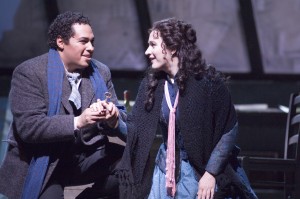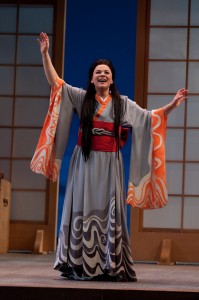Any regular Seattle Opera attendee might remember hearing several slightly tenorial shouts of Bravo! after an aria or at the end of a performance, a sound that carried over even the most tumultuous applause. It came from standing room and from a very discriminating opera lover who passed away on November 21. For most of the last fifteen years Dr. Winfield Hutton (or Winfield Dr. Hutton as he styled himself) lived roughly six months in Seattle and 6 months in Schwerin, a city very near Denmark in north Germany. A teacher for most of his life, he communicated with me regularly since he came to Seattle. He never worked for Seattle Opera but volunteered both for the Seattle Symphony and the Chamber Music Society. His life basically was music, he particularly loved Wagner, and he came to Seattle because of Seattle Opera.
He was a character. Married and divorced twice, in his eighth decade he had romantic relationships with two German women of a similar age, one of whom came to America for the 2005 Ring. He conserved on everything in order to go to opera. In Seattle there was a time when he slept on a mattress in a friend’s house, and he never used anything but public transportation. He was clearly the most frequent standee at the Opera and never failed to write me at length about his opinions on each of our performances.
He particularly loved the directorial work of Stephen Wadsworth and Peter Kazaras even when either moved away from what the Germans call werktreu productions (completely traditional stagings). I argued a lot with him on that, but he was not to be changed: Aida should take place in the time of the Pharaohs; La Boheme in 1830 Paris, and the Wagner operas, which he loved best, exactly as the Master indicated.
He had a very good ear and often wrote me about singers in Germany. I never checked out his recommendations until one afternoon in Berlin, I saw that La boheme had been substituted for a new production of Don Giovanni that night at the Komische Oper. I almost cancelled my ticket as I knew the Kupfer production they were presenting until I noted that Gun-Brit Barkmin, of whom he had often enthusiastically written, was the Mimi. Everything he had written about her turned out to be true, and I realized that he really knew something about singers. She came to Seattle only once after that (in the same role), but now she is a frequent singer in the Vienna State Opera, several theaters in Switzerland, and recently sang in an important concert opera performance in Carnegie Hall.
At a later time he strongly recommended another soprano, Ausrine Stundyte. I heard her and agreed. She sang both Madama Butterfly and Tosca at Seattle Opera successfully and has become well known in Europe for more dramatic roles such as Lady Macbeth of Mtsensk, Kundry, and Crysothemis in Elektra. Win particularly loved her performances, and he was absolutely right about her acting and musical abilities.
He had a varied educational background. Most of his collegiate work was at Ohio State, where he received a Ph.D in marketing in 1959. His European time occurred because after teaching for a few years at Hunter College, he taught at the University of Maryland’s classes in Germany for U.S. servicemen and their families, a position that he enjoyed from 1968 until 1999. He started his sojourns to Seattle the next year and never missed a single opera when he was here.
He came to live full time in Seattle two years ago because he needed Medicare, and his last Seattle opera was Ariadne auf Naxos last May. He couldn’t trust his sense of balance, rarely left his apartment, and was increasingly disabled and reclusive. Still, he somehow managed to get to meetings of the Capitol Hill neighborhood associations (especially the Transit Riders Union) and supported candidates at all levels. Since Elizabeth Warren, his favorite current politician, is not running for President, he enthusiastically endorsed Hillary Clinton.
Last Friday he sent several friends an e-mail that he had decided to “aggressively terminate his life,” which is exactly what he did.
I knew him mostly through his letters and valued both his ideas and his love for opera, as intense a love as I have ever known. I imagine he didn’t expect to be mourned publically, but for those of us who knew him the loss is great. He is unforgettable.



What a lovely tribute. I wish I had known him.
Thanks, Speight, for this touching tribute. This gentleman is the kind of opera lover that I admire. He knows what he likes, he supports what he cares about and is focused on great singing. I hope there are others that will take his place.
I was a student of Dr. Hutton’s in Germany and stayed in contact with him over the last 20 years, exchanging Christmas letters. Thank you for the lovely tribute. He was an interesting person who I have enjoyed knowing.
I too was a student in his Intro to Business class in the fall of 1973 at the University of Maryland’s Munich campus.. He impressed me to the point that 45 years later I was searching his name on Google. I am sad to find this tribute, but happy to hear he lived a full life.
Thank you for Your wonderful tribute to my good old friend Win, who spoke often with enthousiasm about You.
We met us in Munich / Bavaria and staied in contact during 40 years.
My husband Mario and me have the same human and intellectual experience with him.
We remember his humour and sensibility.
I keep looking for new posts – is this blog now defunct?
Saw a great production of ‘Marriage of Figaro’ Friday night (1/29/16) but there was no Speight Jenkins standing at the stop of the stairway greeting everyone.
I too was a student of Dr. Hutton’s in Germany – Fall 1973, Intro to Business – and I often thought of him because he was such a character. Nice tribute.
Dr. Winfield Hutton was the best Prof I ever had! Articulate, thoughtful, BRILLIANT, patient, kind … there are not enough adjectives, superlatives or accolades to appropriately describe my reverence ..
Growing up, Econ theories were often the topic of dinner conversations. My dad used every-day illustrations to demonstrate supply and demand theory. As we grew older, international balance of trade, monetary fluctuations, and the like were routine. I would have loved to be a fly on the wall if he & Dr. Hutton had ever had the opportunity to meet!
I knew Winfield during his time in Schwerin, Mecklenburg-Vorpommern in Germany. He was very interested in politics, often came to our events and actions of the Left Party in Schwerin, helped with the election campaign. At concerts in our beautiful historic theatre, he sat directly behind my parents, who also knew him because of his “Bravo” shouts.